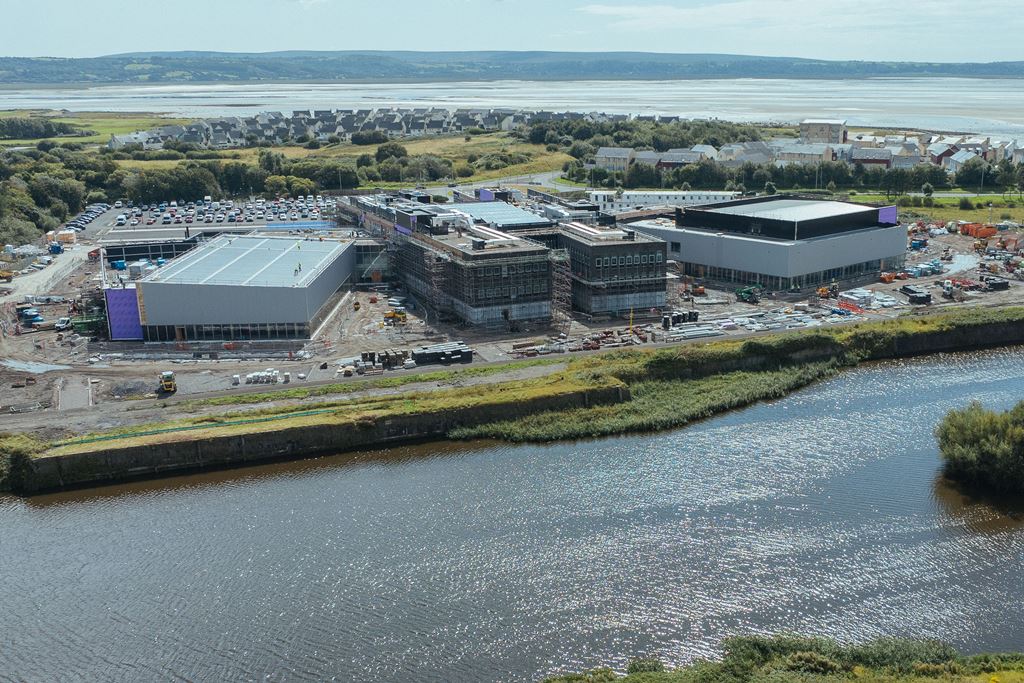Main contractor Bouygues UK says that over the past two years it, and its suppliers, have adopted a range of energy, waste and resource-saving measures to reduce carbon.
Foremost among these was the use of hydrotreated vegetable oil (HVO) as fuel, which is now going to be rolled out across Bouygues UK’s sites.
Bouygues UK is building the £96m first phase of Llanelli’s Pentre Awel health campus development. Phase one of Pentre Awel is called Canolfan, which is Welsh for centre
Canolfan includes a leisure centre and a health and well-being academy run by Swansea University.
With its subcontractors and suppliers, Bouygues is claiming to have achieved net zero during the course of the 24-month build. This includes a reduction of more than 90% on direct emissions of all fuels on the site as well as a 10% reduction in waste production, and in energy and water consumption. Since the start of the project more than 450 tonnes of carbon emissions have been saved thanks to this initiative, it says.
Early into the development, solar-powered site offices and cabins were installed on site. When not powered by the sun, those buildings were run by a HVO-powered generator. The site’s CCTV cameras were also powered by solar. Such was the success of the HVO generator, that early into the project the whole site was converted to HVO, despite the extra cost.
Sensitivity to the sustainability debate surrounding HVO, Bouygues has ensured that it buys only HVO that is International Sustainability & Carbon Certification (ISCC) approved, from suppliers including Green4Wales, Watson Fuels, New Era and CSS.

Other initiatives such as working closely with its supply chain to source recycled building materials has also contributed to the project’s net zero credentials. Such materials include using rebar for the foundations that are comprised of 98% recycled content, while the structural steel contained 80% recycled content.
When excavating to lay the foundations, soil from the surface of the site was also taken to a local recycling facility where the material was segregated, treated and reused, thus reducing the amount of waste going to landfill.
The team partnered with Carmarthenshire-based ecological consultancy Gaia Group to achieve energy savings of 47.9% to date. The project also has a carbon consultant who advises on identifying low carbon solutions throughout the construction phase and monitors carbon, waste and deliveries.
Subcontractors and suppliers helping to the project to net zero include Alun Griffiths, Shufflebottom, Dyfed Steels, Davies Crane Hire and Dyfed Recycling Services.
Project director Peter Sharpe said of achieving net zero: “We are immensely proud of this achievement. As well as building a state of the art, top quality facility, as a project team we set our minds to reducing as much of our carbon emissions as possible. We set out a plan and I’m so pleased to say that we have achieved it.
“This would not have happened had it not been for the determination and support of not only the Bouygues UK staff here at Pentre Awel, but also our amazing sub-contractors and supply chain partners who came with us on this net zero journey.”
Phillipe Bernard, chair and chief executive of Bouygues UK, said: “I commend the project team’s efforts in significantly reducing carbon emissions at the Pentre Awel project. This achievement shows that sustainable construction can be achieved. We are very proud that due to the success achieved with the use of HVO at Pentre Awel, we are now mandating the use of sustainably-certified HVO at all our sites across the UK.”

